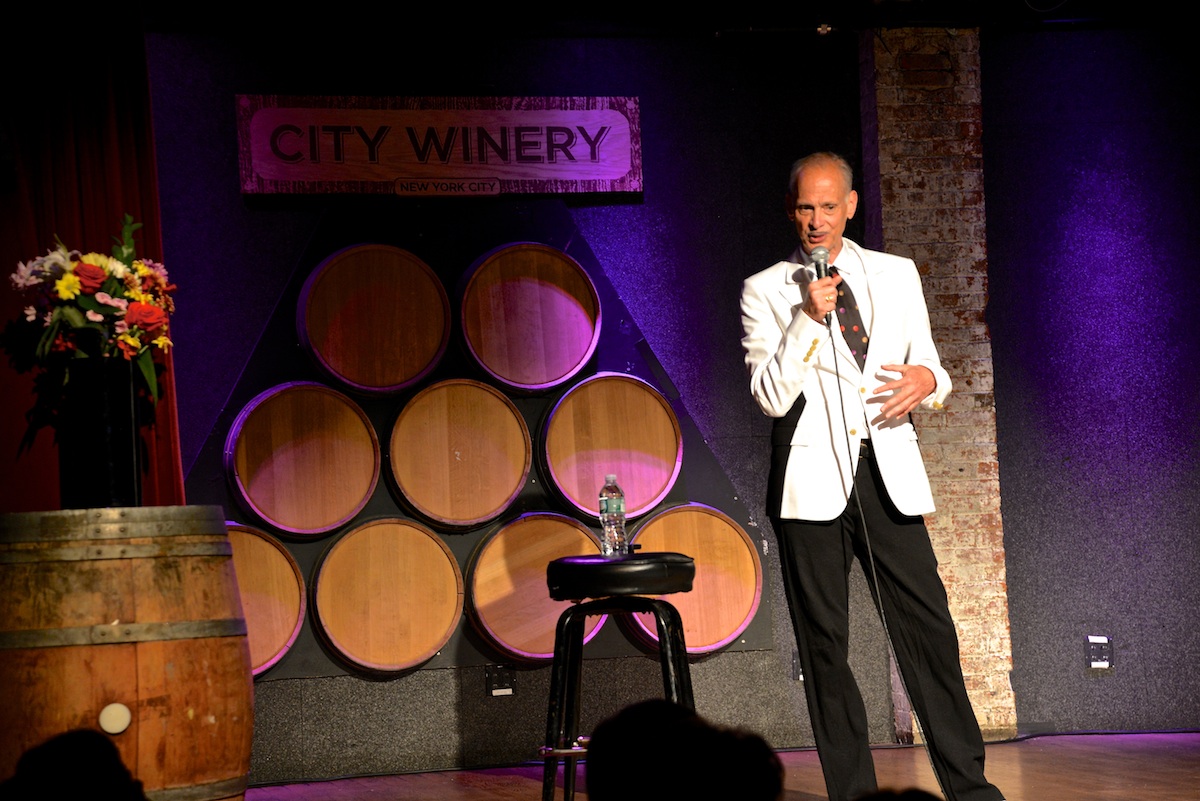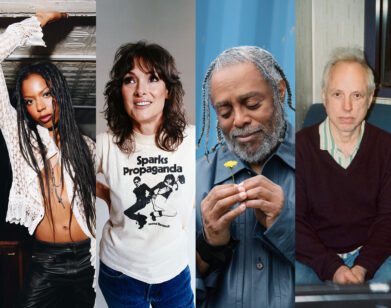Coming In with John Waters

ABOVE: JOHN WATERS PERFORMING THIS FILTHY WORLD AT CITY WINERY
The notorious filmmaker John Waters breezed into New York City recently for a two-night performance at the City Winery in Tribeca and returns tomorrow, July 20, to perform his one-man show, This Filthy World, at the Ice Palace in Cherry Grove in Fire Island (it’s part of “The Icon Series” designed by gay party promoter Daniel Nardicio, which includes an assortment of other showbiz celebrities). Waters’ shows are a fast-paced monologue of hilarious anecdotes and observations, touring several dozen times a year, including Christmas and Halloween versions.
At City Winery, we met Waters at a private dinner composed of a small group nestled among large steel wine casks. Wearing a dapper white suit, he was kind enough to allow us to sit next to him, as long as we promised not to get any food stains on his jacket. Waters was abstaining from the selection of fine wines for the night and ate the fish, not the steak. Despite his reputation for outrageous iconoclasm, he was warm and easy-going throughout the meal.
Waters spoke casually about his recent cross-country hitchhiking adventure, in which he anonymously bummed 21 rides with strangers in nine days, starting out from his Baltimore home and winding up at his apartment in San Francisco. He met some interesting characters along the way, like 20-year-old Maryland Republican councilman Brett Bidle, who drove four hours out of his way to Ohio, then later to Reno; and indie-rock band Here We Go Magic. He’s just written a book about the experience that will come out next year, entitled Car Sick. Since hitchhiking has become uncommon, some of the cars passing by thought the filmmaker was a homeless beggar. Not exactly: Waters achieved his greatest commercial success when his 1988 film, Hairspray, which only grossed $8 million, was adapted into a Broadway musical that grossed more than $200 million worldwide.
Will Waters ever direct another film? He mentioned a children’s Christmas film project, called Fruit Cake, which he described as “Little Rascals on acid.” It’s on hold since it was turned down in 2009. He’s interested in the potential of television as a medium to replace film. Meanwhile, Waters is focused on writing books, touring his show, and mounting art exhibitions, and shuttling between his four residences: his hometown, Baltimore, a summer residence in Provincetown, and apartments in San Francisco and New York City.
After the meal, Waters immediately stepped onto the stage for a one-hour, nonstop, witty tour-de-force performance. A spry 67-year-old, he satirizes today’s brave new world and evokes memories of the past. He explained to the audience that the film that made him famous, Pink Flamingos, is all about limits. When he showed the movie at a jail, the group of prisoners including murderers and rapists, afterwards told him, “You are fucked up, man!”
JOHN WATERS: Are you the one with blue lipstick? You asked me at the end of the show if I ever ate pussy.
GERRY VISCO: Yes. That was a good question, don’t you admit? How many times, John? Let’s get the truth.
WATERS: It was quite a while ago.
VISCO: Well then, maybe it’s time for a second time.
WATERS: I don’t think I’m going to come in at 67.
VISCO: You never know.
WATERS: I know.
VISCO: You’re in Provincetown now? What are you doing there?
WATERS: I’ve written all my books and movies here. I just finished my new book, Car Sick, here—it’s going to come out next year. I’m not on vacation. I do take a one-week vacation every year, and I go to London, in the fall. But it is beautiful here in Provincetown. I take a break for an hour in the afternoons and go swimming. And I ride my bike. It’s about as healthy as I can get.
VISCO: That’s why you look so young.
WATERS: Maybe you’d better check your prescription. But I just hitchhiked across the country by myself, so I must be in okay health.
VISCO: Would you say you have a joie de vivre?
WATERS: Yes, I do. I basically believe in the goodness of people. My dreams have come true. I mean, everything I wanted to happen as a kid has already happened. It makes my friends want to puke when I say that, but it has! I’ve been understood. For the first 10 years, I never got a good review, but that’s all right, I built a career on that.
VISCO: But you developed a cult following even though the films weren’t well received initially.
WATERS: They were received well by the audience, just not by the critics. Today it’s completely different: the critics today are all hip. Then, the critics helped because they would rise to the bait and say, “Where do these people come from! Where do they go when the sun goes down! Isn’t there a law or something?” You can’t help but use that in the ads. That’s a great, great advertisement. Today, critics are too hip and wise to give you that. A cultural revolution was going on then. It was us versus them. Nowadays, all critics pretend at least to be fairly hip.
VISCO: What’s the first good review you received?
WATERS: Fran Lebowitz in Interview Magazine for Pink Flamingos.
VISCO: Your shows are fantastic. You remember all the lines. How often would you say you perform those shows?
WATERS: I have a Christmas show and a horror version for horror conventions. I’d say 40 shows a year.
VISCO: Do you have a new show planned for next year?
WATERS: I keep continually updating it. It might be called The Filthy World, but the current version is maybe 2% the same as the DVD that came out a long time ago.
VISCO: It’s topical. You always include things happening in the current time.
WATERS: Even things that happened that day.
VISCO: When did you start doing your shows?
WATERS: I started doing them in the 1960s with Divine. That was how it started. The college circuit then was the only way you could see any kind of art movies. I would come out dressed up like a hippie pimp. Divine would come out and throw dead fish in the audience. We’d have a fake cop come in and try to arrest us, and Divine would strangle him! It was like a vaudeville show. It grew into this version, where I have no props, no visuals, and I don’t even talk about the movies that much!
VISCO: You were doing shows in the ’60s, and then you started it again 10 or 15 years ago.
WATERS: I had an agent. New Line Cinema had a college agent. Ever since they got me films, I’ve done it through colleges.
VISCO: Speaking of colleges, I heard you were thrown out of NYU!
WATERS: I was thrown out of the dorm! They said they I needed intensive psychiatric treatment and I never went back. It wasn’t completely NYU’s fault, because I only went to one class. I used to steal books from the bookstore and re-sell them to get money; I went to movies three times a day on amphetamines and acid. So I really don’t hold any grudges against NYU. I’ve been back two times to speak—not officially. Two student groups brought me there.
VISCO: You actually read, right? How often do you read?
WATERS: Every night. Plus, I’m always on planes! I’m never not reading a book. I’m reading one now: Dreadful: The Short Life and Gay Times of John Horne Burn. On the back it says “Dreadful is the poignant biography of a forgotten man who drank himself to death.” [laughs] I just love the title! Dreadful.
VISCO: Do you ever drink anymore, John?
WATERS: I drink on Friday nights. I’m very regimented. The rest of the nights are school nights because I get up in the morning.
VISCO: Do you feel like your drug experimentation days are over with?
WATERS: Pretty much. Every once in awhile I’ll smoke a joint or do a popper, but I’m certainly not going to try salvia… or bath salts! I’m not rushing to experiment with bath salts at 67!
VISCO: Yeah.
WATERS: But I keep up with what the drugs are.
VISCO: Looking at younger generations, how do you feel about being alive in today’s world?
WATERS: If you’re a juvenile delinquent, today you’re a hacker. You live in your parents’ house, they haven’t seen you for two months, they put food outside your door, and you’re shutting down a government of a foreign country from your computer.
VISCO: What would you say is better now?
WATERS: I always think tomorrow’s going to be better. I have fond memories, but I think that kids that are 16 who are starting to rebel are having just as much fun as I did!
VISCO: What do you enjoy now that you didn’t have before?
WATERS: I live in four places! I do have a nice life—but I’ve always had a nice life. Even, when I didn’t have any money. In Baltimore you can always get a good place to live real cheap. I always had a confidence that I could get by. In the 1960’s, if you could save $500, you had enough to move to another city and start a new life. My parents did teach me good values. I always found a way to work, even if it was illegal! I always figured out how to travel and how to live my life the way I wanted to, without hurting anyone else. They did teach me good taste. That’s how I ended up having a career that makes fun of that. You can’t have fun with bad taste unless you know the rules and you break them.
VISCO: How did parents feel about your films?
WATERS: They were horrified! But they paid for them! I paid them back every penny. When my father died, I was very touched. In his safety deposit box, he had the little old papers I’d send from Bank of America when I’d pay him $100 a week from the road. They were supportive, as much as they could be. They came to premieres. My mother said, “I always just hated that in the most hideous scenes the whole audience turned around to look at me because I’m your mother!”
VISCO: Do you have siblings?
WATERS: Yeah. I had a brother who unfortunately died of a brain tumor. In the old days, he was the one who used to collect all the money at the box office. In Pink Flamingos, he’s the jogger Divine almost runs over. And I have two sisters, still today, that I see all the time.
VISCO: Considering your peripatetic lifestyle, where are your friends, mostly? In Baltimore?
WATERS: Everywhere. I have four little lives. I’ve had many friends for 40 years in many places. Unfortunately, in San Francisco most of my friends died. So I have a lot of new, younger friends there. But I think having friends for a long time is a good sign of mental health.
VISCO: Yeah, but you’re single, right?
WATERS: Yeah, but I’ve had boyfriends. I’d say I’ve had three long-term boyfriends in my life.
VISCO: What’s your philosophy about romance and marriage and all that?
WATERS: Gay marriage? Well, I don’t want to get married! But I traveled with Governor O’Malley in Maryland and we got the law passed. But that doesn’t mean you have to get married. I think it’s great people get married. I think I should be able to marry myself. I think I should be able to marry a tree.
VISCO: But don’t you think it’s hard to have a good relationship?
WATERS: Yeah, it’s hard, period. Doesn’t matter if you’re gay or straight. That’s why I never understood why anyone would be mad or threatened by gay marriage. All straight people know how hard it is to find someone it really works with.
VISCO: What are you working on in the next year or two?
WATERS: Well, I just found out today that the publisher liked my book! I’ll probably do another book, get a movie made, speaking engagements. I definitely have an art show at Mary Boesky gallery in November 2014.
VISCO: In terms of your visual art, you consider yourself a conceptual artist?
WATERS: I think so. I use photography, but I’m hardly Ansel Adams. I use photography to do storyboards to tell different versions of movies that I re-edit, and to make different points with other directors’ images.
VISCO: As a director, you have a visual and writing talent.
WATERS: Well, I wrote all my movies. I write my spoken word. So I guess I’m a writer most.
VISCO: You did cinematography too, though?
WATERS: Yes, but they took that away from me! [laughs]
VISCO: When I interviewed Mink Stole she told me your scripts were very… precise.
WATERS: Mink has a great new album! She can really sing. And she’s in a Tennessee Williams play…
VISCO: Right, with Penny Arcade?
WATERS: Exactly—it ought to be great. But yes, it’s true. There was no ad lib in my films. I never had the budgets for that! And still, I barely have the time to get the shots I need. If I find I want to change something, well, that’s what rehearsals are for. I get weary when I see movies with too much ad-libbing these days in Hollywood. That doesn’t make it better. You’re a writer? Go write your own movie!
VISCO: But sometimes people assume you worked more like Warhol.
WATERS: But with Warhol, the improvisation became a style. He did it brilliantly. And he got people who could just talk and talk and talk.
VISCO: If we group your films, we can say there were the early, more experimental movies and then your supposed switch to mainstream…
WATERS: I don’t know about the word experimental. To me that sounds more like original underground film—like Stan Brakhage. I made underground movies, midnight movies, then independent movies, then Hollywood movies. And my last film was really a Hollywood underground movie. I’ve made every kind of movie.
VISCO: Maybe it’s partly a question of distribution, but was there a shift in your sensibility?
WATERS: No. When Hairspray came out, I never expected it to be a bigger hit than the others. Before that I certainly learned, along the way, how to make a film more “together”-looking. Crybaby was definitely a Hollywood movie. And Serial Mom, which I think is one of my best films, was the one where I had the most money ever. I had 13 million dollars. It was the only movie where I really did have enough. I have nothing against Hollywood movies.
VISCO: Do you have mixed feelings about making more films?
WATERS: What they want in the independent world now is for you to make a film for one million. I can’t do that. Mine usually cost about five and have a lot of people in them and music written… I think TV is where people are working these days, and I’m not against that. I just like to tell stories. But I’m not going to go be a faux underground filmmaker.
VISCO: Any good gossip about anyone you’ve worked with?
WATERS: If it were good gossip, they wouldn’t want me to tell! I’m very loyal to the people I’ve worked with and am still friends with a lot of them. I’ve never had a problem with anyone I’ve worked with, and I think they’d have nice things to say about me. You know, I don’t understand directors who think that tension on the set makes a better movie. I think it makes a worse one. I make comedy. Maybe if I were making A Long Day’s Journey into Night, I’d feel differently. When I have meetings with people who are going to be in my movies I can tell if they’re going to have a sense of humor or not. If they use the word “journey” too much, I don’t hire them.
VISCO: A good test.
WATERS: Yeah… Or “the path we take.” That’s another one.
VISCO: What filmmakers do you like?
WATERS: I like Todd Solondz. I think Pedro Almodóvar is the best filmmaker in the world… I like Todd Phillips, François Ozon, Harmony Korine… many!
VISCO: And writers?
WATERS: Oh god. What did I just read? Eric Fischl’s book on being a painter was quite good. I just finished Big Brother by Lionel Shriver. I like her work a lot. I like this Italian writer, Elena Ferranti… I’ve been reading all about her.
VISCO: And you didn’t finish college, did you?
WATERS: I didn’t finish any school! Back then you went to school to figure out what you wanted to be. I knew what I wanted to be. I wish I’d quit school at 16—I’d probably have made two more movies by now.
JOHN WATERS WILL APPEAR TOMORROW, JULY 20, AT ICE PALACE IN FIRE ISLAND TO PERFORM HIS ONE-MAN SHOW, THIS FILTHY WORLD.






